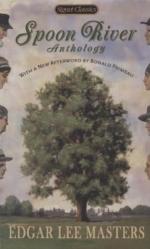|
This section contains 6,683 words (approx. 23 pages at 300 words per page) |

|
SOURCE: “Spoon River: Politics and Poetry,” in Papers on Language and Literature: A Journal for Scholars and Critics, Vol. 23, No. 3, Summer, 1987, pp. 347-63.
In the following essay, Burgess examines politics in small-town America as a central theme in Spoon River.
On the evening of 19 July 1892, nearing his twenty-fourth birthday, Edgar Lee Masters left Lewistown, Illinois, for Chicago, first riding the “Narrow Gauge” railway along the Spoon River valley. His autobiographical writings describe his growing malaise, a sense of “sinking deeper and deeper into weariness and ineffectual striving” in the Fulton County seat village of 2,500.1
At the time of his departure, he was frustrated by family contentions, his own inability to make a living except as an assistant to his lawyer father, and vexing romantic attachments. The satchel he carried contained poetry manuscripts.2 It is fortunate that they did not yield an “artist as young man” version of Spoon...
|
This section contains 6,683 words (approx. 23 pages at 300 words per page) |

|


